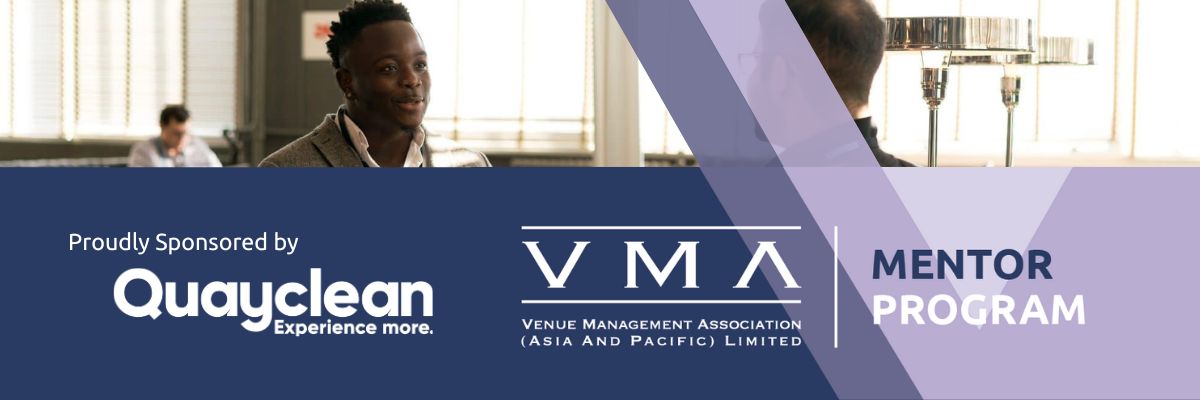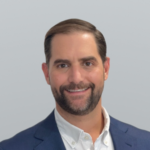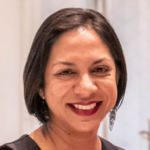
The VMA Quayclean Mentor Program continues to provide a platform for emerging and established venue management professionals to connect, learn, and grow together. As we look ahead to the 2025 intake, there’s no better way to showcase the impact of this invaluable program than by sharing the experiences of this year’s participants.
Mentor Ben Goodwin and mentee Usha Bhana have not only forged a strong professional relationship but have also demonstrated how the mentor-mentee dynamic can foster growth, both personally and professionally. For mentors like Ben, the program offers a platform to give back to the industry, providing opportunities to refine leadership and communication skills, expand their network, and gain fresh perspectives by engaging with the next generation. Mentees like Usha benefit from personalised guidance, gaining access to industry insights, strategies for navigating challenges, and a safe space for open, honest conversations. This two-way exchange helps both mentors and mentees develop in ways that go beyond the workplace, fostering confidence, resilience, and a broader understanding of the industry.

 Ben Goodwin, Director of Strategy and Transformation, Melbourne & Olympic Park Trust (MOPT)
Ben Goodwin, Director of Strategy and Transformation, Melbourne & Olympic Park Trust (MOPT)
Why did you sign up to become a mentor for the 2024 Quayclean mentoring program?
Ben: I joined the program to connect with others in the industry, offering a chance to share my experiences and insights while learning from others. Having participated in the 2023 program, I see it as a valuable platform to support and advise others while also expanding my own understanding and network. It’s a mutual learning experience where both people can explore new perspectives and problem-solving approaches directly related to our industry.
What is your mentoring style, and how do you work with your mentee to overcome challenges?
Ben: My mentoring style is based on open communication and trust. I’m there to share and learn just as much as my mentee. I aim to create a safe space where we both feel comfortable sharing questions and challenges openly, allowing for productive discussions. I provide my own perspectives and approaches, drawing on examples from my experience to give context and potential solutions. I believe that sharing both successes and times when things haven’t worked out offers valuable insights.
We’ve set initial objectives for our discussions and outcomes we want to achieve, which help keep our conversations focused. However, we also leave room to address current challenges and learn from each other regarding broader industry topics. It’s a collaborative process where we both grow.
What have you found most rewarding about working with your mentee?
Ben: The most rewarding aspect has been connecting with someone in the industry and building a strong relationship with them. This has been borne through us both creating an environment where we can openly explore career and workplace challenges. It’s fulfilling to share my experiences in the hope they provide some value or insight, and it feels great to support someone in the industry I might not have connected with otherwise. This relationship has also given me a space to discuss my own challenges and provided an excellent partner to bounce ideas off. Additionally, the shared learning and fresh perspectives have added to my own approach to problem-solving.
What advice would you give to future mentors joining this program in 2025?
Ben: Be open to the two-way learning opportunity that mentoring provides. It’s not just about sharing your expertise but also sharing your experiences, both successes and challenges, to provide genuine insight. Set clear objectives at the start to guide your discussions, but stay flexible enough to explore broader topics as they come up. Building a trusted environment where both parties feel comfortable is key to making the experience rewarding for everyone involved.

 Usha Bhana, Senior Producer, Auckland Live
Usha Bhana, Senior Producer, Auckland Live
How has the VMA Quayclean Mentor Program impacted your professional development so far?
Usha: It’s had a significant impact in two particular areas. First, it’s allowed me to draw on different perspectives in the wider venue industry outside my usual circle of New Zealand performing arts venues. What’s been particularly valuable here is gaining insight into different working practices and approaches which has given me tools to take back to my own job. The other big impact is the comforting realisation that, while different businesses might face their own unique challenges, the core of any issues are comparable across the industry. Despite differences in scale and content, we’re all facing similar situations and there’s a massive amount of support that can be gained through colleagues across the industry as a result.
What has been the most valuable lesson you’ve learned from your mentor?
Usha: This is a really hard question, because it’s difficult to point to one thing and say ‘This! This is the most useful bit right here!’ Mentoring isn’t about soundbites and quick solutions. Overall, the most important part about this experience has probably been being able to view situations through a different lens and, as a consequence, be able to change my approach to things. It’s a process though, which is why it’s so valuable to be able to have an ongoing dialogue with someone.
What challenge or goals are you currently facing and how have you addressed them with your mentor?
Usha: I’ve recently become a team leader for a new-ish team which has come about as a result of an ongoing change process, so there have absolutely been some challenges here. The mentoring sessions have been hugely helpful to discuss ideas and processes around team building, identity, and strategy development. This isn’t a journey I could have taken on my own so it was wonderful to have a sounding board where I could discuss things in confidence with someone who understands the situation and can provide practical advice.
Going into the Mentor Program did you have specific goals you wanted to achieve, or were you uncertain about the direction to take?
Usha: I had a broad sense of where I wanted to go, but was unsure on how to get there. The early sessions were largely centered around developing a plan to go forward, which in itself was a great piece of work.
What would you say to someone considering joining the program as a mentee in 2025?
Usha: Definitely do it. It broadens your perspective and allows you to draw on knowledge from different parts of the industry in a concentrated, directional, one-to-one scenario. This sort of opportunity and access is invaluable, especially at a time when more of us are working in hybrid models. The ability to regularly connect with someone and have a dedicated dialogue about professional development can’t be overstated.
Ready to Make Your Mark? Join the 2025 VMA Quayclean Mentor Program!
The VMA Quayclean Mentor Program offers an invaluable opportunity for emerging professionals to connect with seasoned experts in the venue management industry. Mentees gain access to fresh insights, support, and practical advice that can shape your career. For experienced professionals, being a mentor provides a rewarding platform to guide the next generation while expanding your own perspectives and continuing your professional development.
Click here to register your interest now for the 2025 intake and become part of this transformative program!
